黑龙江虎林八五零农场学校七年级英语上册unit9教案人教新目标版
最新人教版新目标 七年级英语初一上册Unit 9 单元精品教案
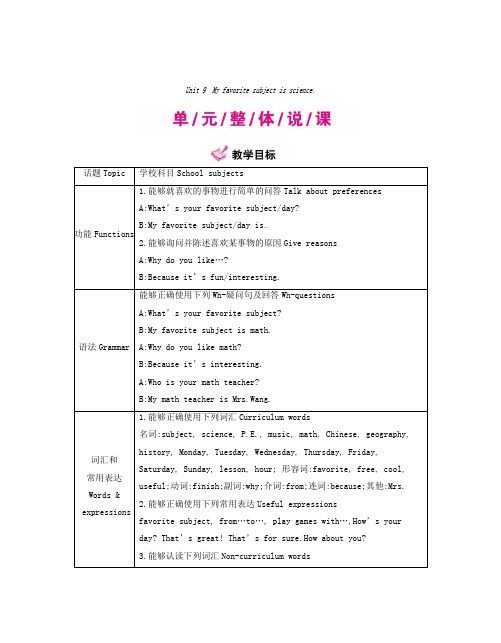
Unit 9 My favorite subject is science.1.学会谈论自己或他人喜欢的事情并给出理由。
2.掌握who, what, why 引导的特殊疑问句及答语。
通过听力入手,符合学生的认知,再通过说和讨论等活动促使学生掌握谈论自己喜好的学科或自己喜好的其他事情并给出理由,并学会用Wh-特殊疑问句来进行口语交际。
教学突破:联系实际,创设语境,通过听说活动反复训练谈论自己喜好的学科或自己喜好的其他事情并给出理由、Wh-特殊疑问句和答语;在阅读中培养学生捕捉细节的能力;并通过写作训练引导学生学会合理地安排自己的作息时间。
注意方法与价值观的培养:以听说带动本单元的话题,在真实的语境中感知本单元的词汇和句型,培养学生良好的沟通能力。
归纳总结Wh-特殊疑问句的构成,培养学生自主学习的能力。
运用循序渐进的写作训练,写出自己一天的学习和活动安排,培养学生自我管理的意识。
第一课时:Section A 1a-1c第二课时:Section A 2a-3c第三课时:Section B 1a-2c第四课时:Section B3a-Self Check星期的由来一个星期有七天,每一天都有一个名称,说起来还有来历呢。
最早给星期中每一天命名的是古埃及人和古罗马人,他们分别以太阳、月亮和五大行星的名称作为一周七天的名称,即the day of the sun 、 the day of the moon 、 the day of the Mars(火星)、the day of the Mercury(水星) 、the day of Jupiter(木星) 、the day of Venus(金星)和 the day of the Saturn(土星)。
随着历史的发展,富有想象力的“约翰牛”(John Bull 英国人)用他们所信奉的神灵的名称来称呼星期中的每一天。
Sunday 太阳之日,Monday 月亮之日,Tuesday 战神之日,Wednesday 是根据掌管知识的文化主神Woden 的姓名来命名的,Thursday 雷神之日,Friday 是根据Woden 妻子Frigg 的姓名来命名的,Frigg 是掌管婚姻大事的女神,Saturday 农神之日,是根据掌管农业的神灵Saturn 而得名。
人教版新目标英语七年级上册教案第9单元
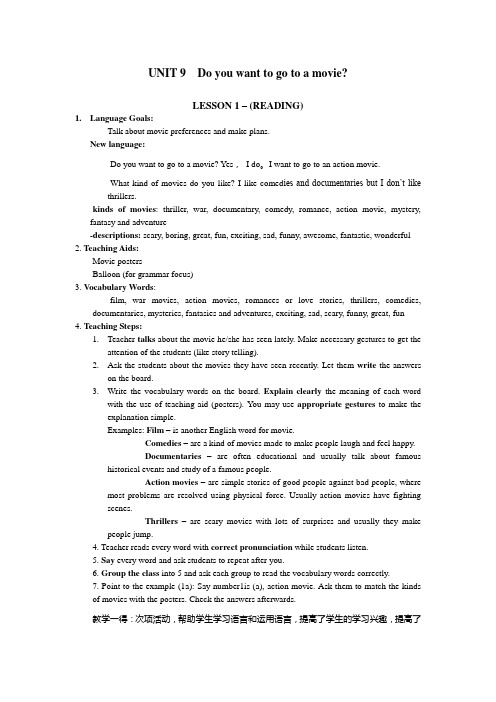
UNIT 9 Do you want to go to a movie?LESSON 1 – (READING)nguage Goals:Talk about movie preferences and make plans.New language:-Do you want to go to a movie? Yes,I do。
I want to go to an action movie.-What kind of movies do you like? I like comed ies and documentaries but I don’t like thrillers.-kinds of movies: thriller, war, documentary, comedy, romance, action movie, mystery, fantasy and adventure-descriptions: scary, boring, great, fun, exciting, sad, funny, awesome, fantastic, wonderful 2. Teaching Aids:Movie postersBalloon (for grammar focus)3. Vocabulary Words:film, war movies, action movies, romances or love stories, thrillers, comedies, documentaries, mysteries, fantasies and adventures, exciting, sad, scary, funny, great, fun4. Teaching Steps:1.Teacher talks about the movie he/she has seen lately. Make necessary gestures to get theattention of the students (like story telling).2.Ask the students about the movies they have seen recently. Let them write the answerson the board.3.Write the vocabulary words on the board. Explain clearly the meaning of each wordwith the use of teaching aid (posters). You may use appropriate gestures to make the explanation simple.Examples: Film –is another English word for movie.Comedies– are a kind of movies made to make people laugh and feel happy.Documentaries–are often educational and usually talk about famous historical events and study of a famous people.Action movies– are simple stories of good people against bad people, where most problems are resolved using physical force. Usually action movies have fighting scenes.Thrillers–are scary movies with lots of surprises and usually they make people jump.4. Teacher reads every word with correct pronunciation while students listen.5. Say every word and ask students to repeat after you.6. Group the class into 5 and ask each group to read the vocabulary words correctly.7. Point to the example (1a): Say number1is (a), action movie. Ask them to match the kindsof movies with the posters. Check the answers afterwards.教学一得:次项活动,帮助学生学习语言和运用语言,提高了学生的学习兴趣,提高了他们的参与意识。
七年级英语上册 unit 9公开课说课稿 人教新目标版
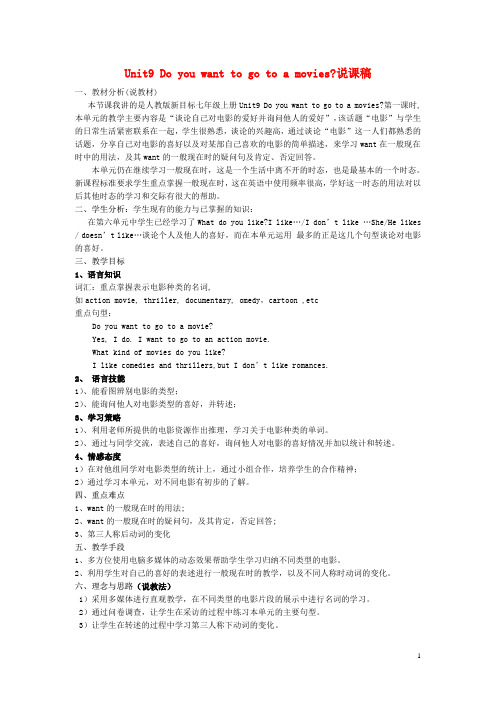
Unit9 Do you want to go to a movies?说课稿一、教材分析(说教材)本节课我讲的是人教版新目标七年级上册Unit9 Do you want to go to a movies?第一课时,本单元的教学主要内容是“谈论自己对电影的爱好并询问他人的爱好”,该话题“电影”与学生的日常生活紧密联系在一起,学生很熟悉,谈论的兴趣高,通过谈论“电影”这一人们都熟悉的话题,分享自己对电影的喜好以及对某部自己喜欢的电影的简单描述,来学习want在一般现在时中的用法,及其want的一般现在时的疑问句及肯定、否定回答。
本单元仍在继续学习一般现在时,这是一个生活中离不开的时态,也是最基本的一个时态。
新课程标准要求学生重点掌握一般现在时,这在英语中使用频率很高,学好这一时态的用法对以后其他时态的学习和交际有很大的帮助。
二、学生分析:学生现有的能力与已掌握的知识:在第六单元中学生已经学习了What do you like?I like…/I don’t like …She/He likes / doesn’t like…谈论个人及他人的喜好,而在本单元运用最多的正是这几个句型谈论对电影的喜好。
三、教学目标1、语言知识词汇:重点掌握表示电影种类的名词,如action movie, thriller, documentary, omedy,cartoon ,etc重点句型:Do you want to go to a movie?Yes, I do. I want to go to an action movie.What kind of movies do you like?I like comedies and thrillers,but I don’t like romances.2、语言技能1)、能看图辨别电影的类型;2)、能询问他人对电影类型的喜好,并转述;3、学习策略1)、利用老师所提供的电影资源作出推理,学习关于电影种类的单词。
人教版新目标七年级英语上册Unit 9集体备课教案设计

3. He likes math becauseit's interesting.(对划线部分提问)
Whydoeshelikemath?
Homework
师引导学生课后完成本课时对应练习,并预习下一课时内容。
教
学
反
思
集体备课教案
首备人
七年级组
复备人
课型
5.教师让学生把1c中的日程表中从Monday—Sunday的单词及学科单词读出来。(教师听学生在发音上是否有错误,如有及时纠正)
6.教学1d。将1d的对话补充完整,学生依照1d的模式谈谈戴维最喜欢的学科。
7.以组为单位调查小组各成员最喜欢的学科及原因,及上课的时间。教师与小组代表问答。
T:What’s Wang Hui’s favorite subject?
(2)Who is Bob's P.E. teacher?
(3)Why does Bob like history?
(4)What's Frank's favorite day?
7.教师讲解重难点。
【语法提要】
1.Chinese
(1)Chinese用作不可数名词,意为“语文;汉语;中文”。
例句:Can you speak Chinese?你会说汉语吗?
重点
难点
1.学会运用特殊疑问句。。
2.能听懂关于自己最喜欢的学科等内容的对话并与同学谈论此话题;学会周一到周日的英语表达法;能读懂有关描述学校课程安排以及课程喜好的短文;能简单介绍自己某天的课程表和所喜爱的学科并说明原因。
教法
学法
导学、独学、互学、小展示
最新人教版新目标七年级英语上册unit9单元教案

最新人教版新目标七年级英语上册unit9单元教案Unit 9: ___ Science___:___ appreciate us subjects。
and to pursue their own ideals。
It also ___.Unit Objectives:1.Knowledge and Skills:___ us subjects.___ and learn some related adjectives.State their own ___.Ask and answer ns using different interrogative words (what。
why。
who。
when。
etc.).Learn about other students' favorite subjects。
___.Foster students' interest in science and ___.2.Process and Methods:Observe pictures。
watch videos。
listen to recordings。
engage in dialogues。
perform。
play games。
and participate in group activities.3.Attitudes and Values:Develop students' interest in science and ___.___.___:___-centered learning.___:Read more and think deeply。
participate in group cooperative learning.___:Lesson 1: n A1a-2d___:1.Knowledge and Skills:Master vocabulary: school subjects (science。
人教版新目标初一英语七年级上册Unit9全单元教案

Unit 9 My favorite subject is science 一、教学内容,目标和要求题目My favorite subject is science题材内容1本单元以学生的学科为题材,谈论自己最喜欢的学科并给出理由。
2谈论自己喜爱的其他东西并给出理由。
3学会说出一周的七天。
4学会合理安排自己的作息时间。
教学目标语言知识目标功能谈论自己喜爱的东西并给出理由语法What , Why, Who引导的特殊疑问句;because 表示理由;表示性质的形容词。
词汇math, science, history, P.E. favorite, teacher, Monday, Tuesday,Wednesday, Thursday, Friday, Saturday, Sunday.语言技能目标听能听懂别人谈论偏好以及所阐述的原因。
说能询问对方或他人的偏好以及原因;能根据他人的询问做出回答。
读能读懂谈论人物偏好的文章。
写能向别人介绍自己偏好的内容并能阐述理由。
演示表达能在同学之间谈论自己的偏好并阐述理由。
学习策略自学策略培养看图说话和逻辑思维的能力合作策略掌握询问对方偏好的方式,了解对方。
文化意识了解英美国家课程安排上的不同。
情感态度说话时情真意切,令对方感觉诚实,借机培养积极的情感。
任务能够运用所学句式结构询问不同的人的偏好及原因。
二、教学内容分析本单元作为七年级上册最后一个单元,具有加深和总结的作用。
因此,在内容选择上具有梳理作用,谈论自己或询问对方的偏好并阐明原因。
以一般现在时态的特殊疑问句的询问为主,并借此学习了学科和一周中星期一至星期五的表达。
三、教学过程建议这里所写的教学过程建议是以教材活动的安排为线索,分为“导入”,“听力/阅读”,“说”和“写”几个部分,基本体现了课堂教学程序。
在教学过程中,对于大家所熟知的活动操作不做具体描述,对整个课堂的操作不做细致的描写,对于每一个活动可以采用的操作变化有适当的补充。
人教版新目标英语七年级上Unit9教案

Unit 9 Myfavorite subject is science.Period 1Step 1 Warming up and lead in1.用电影Harry Potter预告片作为本课热身,看完之后向学生提问:Do you like the film?然后老师继续表达自己的看法:I like this film best. It’s my favorite movie. What’s your favorite movie?(教师这个时候把这个句型写在黑板上,引起学生的注意。
)提出这个问题以后,让学生说说自己看过的影片,操练本课的重点句型:What’s your favorite … ?操练结束以后,老师继续说:I like Harry Potter, because he is a good student. He works very hard and does so well. Let’s see how he works, ok? (用幻灯片展示Harry Potter上课的情形) (Harry Potter这个电影片段主要是考虑到学生本身对这个人物比较感兴趣,有利于激发学生的兴趣,其次是因为Harry Potter本身也是一个学生,他在一所魔法学校里读书,而且学习的课程也很多。
这点跟本课比较贴近。
使用该片子,教师使用谈话的方式,轻松的把话题由Do you like the film? ——What’s your favorite movie? 提出这个问题以后,让学生说说自己看过的影片,有利于扩大大家的视野。
同时也是为了引出本课的重点句型:What’s your favorite … ? 并让学生在表达的时候操练该句型。
在阐述喜欢Harry Potter的理由时,也是德育教育的一个过程。
)Step 2 New words learningT:Do you know what subject it is? 跟学生介绍Harry Potter在魔法学校的课程,然后问学生:And what subject do we have? (幻灯片展示学生平时的课程)展示完成以后,进行本单元词汇的拓展,问学生:Do you know any more subjects?进行小范围的提问,并要求回答的学生把词汇写在黑板上。
人教版新目标七年级英语上册unit9单元教案
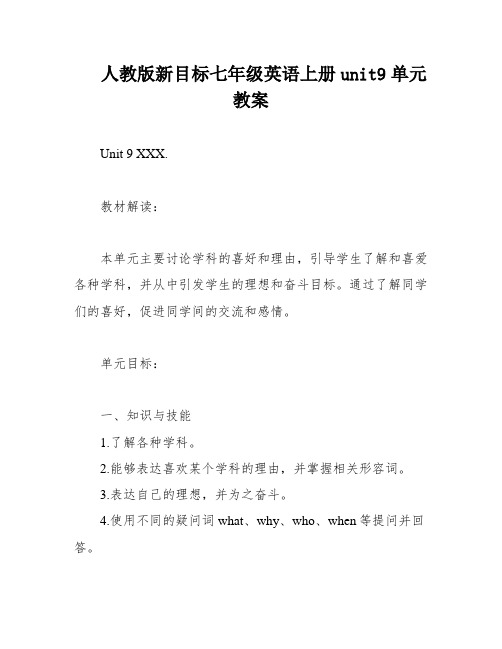
人教版新目标七年级英语上册unit9单元教案Unit 9 XXX.教材解读:本单元主要讨论学科的喜好和理由,引导学生了解和喜爱各种学科,并从中引发学生的理想和奋斗目标。
通过了解同学们的喜好,促进同学间的交流和感情。
单元目标:一、知识与技能1.了解各种学科。
2.能够表达喜欢某个学科的理由,并掌握相关形容词。
3.表达自己的理想,并为之奋斗。
4.使用不同的疑问词what、why、who、when等提问并回答。
5.了解同学们最喜欢的学科,加强同学间的交流,增进感情。
6.培养学生对科学的兴趣,激发学生探究科学的热情。
二、过程与方法观看图片、视频、听录音、对话、表演、游戏、小组活动等。
三、情感态度与价值观通过本单元的研究,培养学生对科学的兴趣,激发学生探究科学的热情。
通过了解同学们最喜欢的学科,加强同学间的交流,增进感情。
教法导航:注重精讲和多练,坚持以学生为主体的原则。
学法导航:多读多思,小组合作研究。
课时安排:第1课时:n A1a-2d第2课时:n A3a-3c第3课时:n B1a-2c第4课时:n B3a-3c第1课时 n A1a-2d教学目标:一、知识与技能1.掌握词汇:1)school .2)形容词:interesting。
relaxing.2.掌握句式:1)——What’s your favorite subject? XXX。
2)——Why do you like。
Because it’s。
3.谈论喜欢的学科并表述理由。
二、过程与方法通过图片和视频激发学生的兴趣和求知欲,引导学生主动探索知识。
三、情感态度与价值观通过互相询问和谈论彼此所喜欢的学科,可以增进同学之间的了解和友情,并培养学生热爱研究、热爱科学的思想和良好的研究、生活惯。
教学重点:1.掌握目标词汇和短语,掌握重点句子。
2.培养学生热爱研究、热爱科学的思想和良好的研究、生活惯。
教学难点:1.主动探索知识,小组讨论疑难点,自主解决。
培养学生热爱研究和科学的思想,以及良好的研究和生活惯是教育的目的。
人教版英语七年级上册Unit9整体教学设计

7.结合学生的实际水平,实施分层教学,关注每个学生的学习进度。对基础较弱的学生,给予个别辅导,提高他们的学习效果。
8.定期进行教学评价,了解学生的学习情况,及时调整教学策略,以提高教学效果。
5.培养学生的爱国情怀,学会用英语向外国朋友介绍中国的文化、历史和传统。
二、学情分析
针对人教版英语七年级上册Unit9的教学内容,学情分析如下:
1.学生年龄特点:七年级学生正处于青春期,好奇心强,求知欲旺盛,对于新鲜事物充满兴趣。在本章节的学习中,可以通过引入跨文化交际的元素,激发学生的学习热情。
2.英语水平:经过前几个单元的学习,学生已具备一定的英语基础,但在词汇和语法方面仍有待提高。因此,在教学过程中,要注意巩固和拓展所学知识,逐步提高学生的语言运用能力。
(三)学生小组讨论
1.教师将学生分成若干小组,每组选择一个国家,要求学生用英语讨论该国家的文化特点、风土人情等。
2.各小组向全班展示讨论成果,其他小组的学生可针对展示内容进行提问,以此提高学生的口语表达能力和跨文化交际意识。
3.教师引导学生运用所学词汇和语法,就“Do you want to have a pen pal from another country? Why?”这一话题展开小组讨论,培养学生的思辨能力和合作精神。
3.写作能力:学会用英语书写书信,表达自己的观点和情感,对学生来说具有一定的挑战性。
(二)教学设想
1.采用情景教学法,引入真实语境,让学生在实际交流中运用所学词汇和语法。例如,组织学生模拟与笔友写信、交流的活动,提高学生的语言实际运用能力。
2.利用多媒体教学资源,如图片、视频等,帮助学生形象地理解不同国家的文化特点,提高学生的阅读理解能力。
人教新目标英语七年级上册unit9单元教案
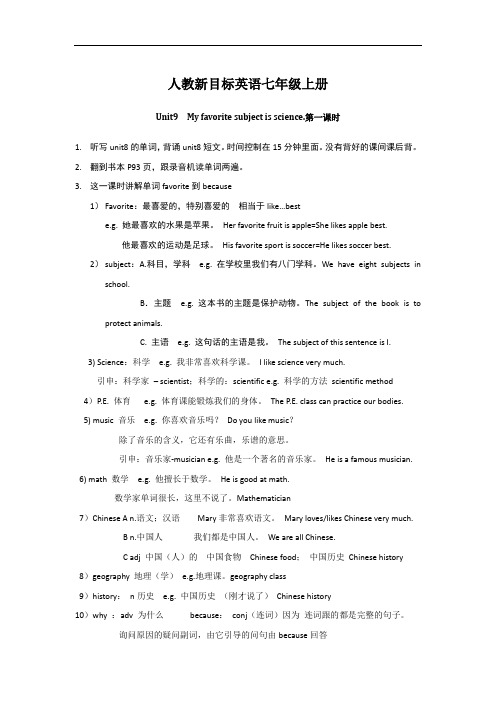
人教新目标英语七年级上册Unit9 My favorite subject is science.第一课时1.听写unit8的单词,背诵unit8短文。
时间控制在15分钟里面。
没有背好的课间课后背。
2.翻到书本P93页,跟录音机读单词两遍。
3.这一课时讲解单词favorite到because1)Favorite:最喜爱的,特别喜爱的相当于like…beste.g. 她最喜欢的水果是苹果。
Her favorite fruit is apple=She likes apple best.他最喜欢的运动是足球。
His favorite sport is soccer=He likes soccer best.2)subject:A.科目,学科 e.g. 在学校里我们有八门学科。
We have eight subjects in school.B.主题 e.g. 这本书的主题是保护动物。
The subject of the book is to protect animals.C. 主语 e.g. 这句话的主语是我。
The subject of this sentence is I.3) Science:科学 e.g. 我非常喜欢科学课。
I like science very much.引申:科学家– scientist;科学的:scientific e.g. 科学的方法scientific method4)P.E. 体育 e.g. 体育课能锻炼我们的身体。
The P.E. class can practice our bodies.5) music 音乐 e.g. 你喜欢音乐吗?Do you like music?除了音乐的含义,它还有乐曲,乐谱的意思。
引申:音乐家-musician e.g. 他是一个著名的音乐家。
He is a famous musician.6) math 数学 e.g. 他擅长于数学。
人教版新目标英语七年级上第九单元教学设计

骤
5
教师活动
学生活动
评价活动设计
设计意图
Make a survey“Who likes action movies ? Who likes comedies….SeeHow many students like the kinds of movies.
A guessing game
Listen carefully think put up their hands and answer the questions.
通过思考回答问题,引入新知识大体what用法。
步
骤
3
Teach“What kind of movies do you like”
Liste.,thin.discus.an.answer.As.an.answe.i.pairs
通过对电影种类的问与答使知识加深,使评价层次也有所提高。
在运用学习单词的后,将1a中的电影种类与实际个人的喜好相连接。
步
骤
7
Let the students make surveys about the kinds of movies ,the names ofactors andtheir favorite movies
Grou.talkin.an.grou.discussing..Finis.th.tas.an.the.giv. thei. report.t. us.
Unit 9 Do you want to go to a movie?
一、教学总体设计
教学
内容
Unit 9 Do you want to go to a movie? Section(A) (1课时)
教
学
目
初中英语 人教新目标七年级上册unit9 Section A 1a-2c公开课教学设计

Unit 9 My favorite subject is science.Section A 1a-2c 教学设计一、教材分析:本单元是人教版新目标七年级上册第九单元。
Unit 9 以“School subject”为话题,选材于学生的日常生活,十分符合学生实际。
对于小升初的学生来说,七年级学生在科目的学习有所增加,学业紧张。
但是谈论各个科目,讨论科任老师是他们乐此不疲的话题。
他们也一定会有自己喜欢的科目,有自己的学习计划。
通过讨论学习,能够提高他们的学习兴趣,进行合理的学习安排。
Section A 主要通过听、说活动让学生了解怎样用英语询问和回答最喜欢的学科和喜欢的原因,以及这些学科的课任老师。
并学会用fun, interesting, boring, difficult, relaxing等形容词来表达自己喜欢某个学科的原因。
学会新词汇和用特殊疑问句What’s your favorite subject?Why do you like...? Who is your ...teacher? 等句型来进行口语交际。
Section B 进一步讨论课程表的安排,星期几,几点上什么课等。
学生学会星期的表达并结合学科的表达进一步提高口语交际能力,并过渡到阅读理解和书面表达,培养其阅读和写作的能力,并把英语运用到日常邮件写作和表达,培养学生在实际生活中运用英语表达的能力。
本单元教学层次分明,循序渐进,Section A呈现基础的话题教学内容,着重训练听说能力,兼顾了语法学习。
Section B在A部分的基础上进一步拓展延伸,加强了阅读和写作技能的训练,帮助学生灵活运用所学语言进行口头笔头输入,这点体现了英语学科育人价值所要求的发展学生听说读写四个方面的语言技能。
二、学情分析本单元是人教版新目标英语七年级上册第九单元,也是最后一个单元。
主要围绕“School subjects”这个话题展开讨论,并懂得询问和回答最喜欢的学科和喜欢的原因,以及星期的表达。
人教版新目标七年级英语上册Unit9SectionA(1a2d)教学设计

4.互动交流:鼓励学生大胆开口说英语,进行师生、生生之间的互动交流,培养学生的听说能力和自信心。
5.反馈与评价:及时给予学生反馈,肯定他们的优点,指出不足,并提供具体的改进建议。同时,开展自评、互评等形式,让学生在评价中反思、成长。
4.布置课后作业,要求学生运用所学知识描述自己的家庭环境,巩固课堂所学。
5.鼓励学生在课后继续关注家庭环境,将所学知识运用到实际生活中,不断提高英语水平。
五、作业布置
为了巩固本节课所学的知识,提高学生的英语实践能力,特布置以下作业:
1.家庭环境描述:请学生运用本节课所学的词汇和语法,写一篇关于自己家庭环境的短文。要求包括家中各个房间的名称和特点,以及房间内物品的描述。鼓励学生尽量使用一般现在时态,不少于100词。
4.教师应关注学生的作业完成情况,及时给予反馈,鼓励学生持续进步。
(二)过程与方法
1.通过图片展示、情景模拟、小组讨论等形式,激发学生的学习兴趣,提高学生的英语听说能力。
2.运用任务型教学法,引导学生积极参与课堂活动,培养学生的合作意识和团队精神。
3.通过自主探究、合作学习,让学生在实践中掌握英语知识,提高解决问题的能力。
4.鼓励学生大胆开口说英语,培养学生的自信心和表达能力。
2.邀请学生分享自己家中类似房间的布置和物品,激发学生对家庭环境的关注。
3.通过提问方式引导学生思考:“How many rooms are there in your house? What is there in each room?”等,为新课内容的学习做好铺垫。
(二)讲授新知
1.教师播放教材中的对话,让学生跟读并关注核心词汇和语法结构,如:There is, There are, bedroom, bathroom等。
人教版新目标 初一英语七年级上册Unit 9 单元教案
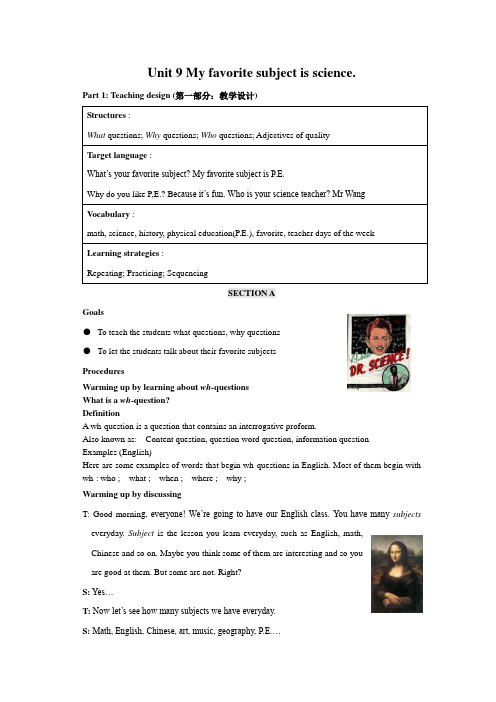
Unit 9 My favorite subject is science.Part 1: Teaching design (第一部分:教学设计)SECTION AGoals●To teach the students what questions, why questions●To let the students talk about their favorite subjectsProceduresWarming up by learning about wh-questionsWhat is a wh-question?DefinitionA wh-question is a question that contains an interrogative proform.Also known as: Content question, question word question, information questionExamples (English)Here are some examples of words that begin wh-questions in English. Most of them begin with wh-: who ; what ; when ; where ; why ;Warming up by discussingT: Good mornin g, everyone! We’re going to have our English class. You have many subjects everyday. Subject is the lesson you learn everyday, such as English, math,Chinese and so on. Maybe you think some of them are interesting and so youare good at them. But some are not. Right?S:Yes…T:Now let’s see how many subjects we have everyday.S:Math, English, Chinese, art, music, geography, P.E.…T: And we have science. Science includes chemistry, physics and geography and so on.1a Matching the words with the picturesLook at the picture on page49, there are many subjects in the picture. Please match the words with picture.1b Listening and circling the subjects you hear in 1aWe have many different subjects everyday. Now let’s listen to the tape and circle the subjec ts you hear in 1a.Read the tapescript to underline the wh-question.1c.Doing pairworkI think you must have your favorite subjects. Please practice the conversationbelow. First read after me and practice it with your partner. I will ask some pair toact it out.Then make your own conversations with your partner like this:2a Listening and putting in order.Listen to the tape and please put the conversation in order. First you just listen and then put them in order. Can you try to place the sentences in right order?2b Listening and matchingYou will hear the conversation. In the conversation, people talk about school subjects. Listen and matching the subjects you hear with the description words.2cThinking and matchingNow what do you think of your subjects? You can give your opinion. You can practice this conversation first.Then you can make up your conversation with your partners and match the subjects with the description words.The answers may be like this:OK, stop! Now please make a conversation using the information in 2a.2d Role-playRead the conversation below, then practice in pairs.Afer a several minutes, I ’ll ask some of you to perform the conversation.3a Filling in the blanks.Fill in the blanks with what, who or why to complete the conversations.3b Writing questons for the answers.Use the setense partern of “what, who or why ” to complete 3b.3c Groupwork1.Ask and answer questions about your favorite subject in the class..2.Fill the chart.SECTION BGoals● To go on talking about favorite subjects● To learn the days of week and the expressions of datesProceduresWarming up by talking about the dateT: Boys and girls! Today we’re going to learn a new part Section B. By theway, what day is it today?S: It’s Tuesday.T: What’s the date today?S: It’s October 9.T:Oh! I see. Let’s open you book and turn to Page52, and learn 1a.1a MatchingLook at your book and find the opposite words for the left words:1b&1c Listening andCheckingNow listen to the tape for 3 times. The first time you have to check the words you hear in 1a. Then listen again and circle the classes David talks about on the schedule in 1c. The third time, you have to check the answers.1d Doing pairworkLook at the schedule in 1c and talk about David’s favorite subject with your partners. Then talk about your favorite subject in pairs.2a WritingThere list some subjects you have learned in school. Write a description for each one.2b Reading and circlingLet’s read the following letter. Underline the things Yu Mei likes. Circle the things she doesn’t like. While reading you should pay attention to the pronunciations and intonation and underline the expressions.2c Completing scheduleWe have read Yu Mei’s letter in 3a. here is Yu Mei’s schedule. Please complete it with the information from 3a. Then we have a clear look about what she does on that day.3a NumberingNumber these parts of an e-mail massage.3b&3c WritingI know you all have busy days. What is your favorite school day? Write your schedule for that day ,then write a e-mail massage to a friend of you.Closing down by playing a guessing gameLet’s play a guessing game.We can play it like this: One student does some actions about one of subjects. And the others guess what su bject it is. Let’s see who can guess the most subjects.SELF CHECK1 WritingWrite out the subjects you have at school and your feelings about them. Thenmake a dialogue as 1d.S2 Filling the blanksComplete the questions with what, when, who or why. Then answer thequestions.Closing down by making a lectureI think everyone has a favorite subject and has his reasons too. Let’s talk about “my favorite subject”. You have five minutes to prepare. Then stand up to give your lecture to us. You can use body language when needed.Let’s learn some names of English songs.Honkey Pokey; How Is The Weather?(天气怎么样?); I Love Little Pussy(我喜欢小猫); I’M A Little Teapot(我是一把小茶壶); If You're Happy(如果你感到快乐); Jimmy Crack Corn (撬开裂纹玉米); Jingle Bells(铃儿响叮当<1>); Jingle Bells(铃儿响叮当<2>); Lazy Mary(懒惰的玛丽); Let Everyone Clap Hands(让每一个人拍手); Let Us Sing Together (让我们一起唱歌); Little Cabin In The Wood(森林中的小木屋); Little Goldfish(小金鱼); Little Green Frog(绿色的小青蛙); Little Peter Rabbit(小兔彼得); Make New Friends (结识新朋友); My Aunt Came Back(我的姑妈回来了); My Brother And I(我的哥哥和我); Oh, Christmas Tree(哦,圣诞树); Oh, Susanna(噢,苏珊娜);Pat A Cake(做个面包); Pop!Goes The Weasel(砰!追逐鼹鼠!); Rain, Rain, Go Away(雨,雨,走开); Reuben Reuben(鲁宾); Roll That Bal(滚动那个球); Round The Clock(围着时钟转); Sally, Go' Round The Sun(萨利绕着太阳转); Sea Shells(海洋贝壳); She'll Be Comin' Round The Mountain(她将绕过这座山脉过来); Simple Simon(头脑简单的西蒙); Sing Together(一起歌唱); Six Little Ducks(六只小鸭子); Smile(微笑); Ten Fat Sausages(十根肥香肠); The Ants Go Marching(蚂蚁在行军); The Bear Went Over The Mountain(小熊上了山); The Family(家庭); The Farmer In The Dell(农夫在小山谷中); The Finger Family(手指家庭); The Months(月份); The More We Get Together(我们在一起越多)Part 2: Teaching Resources (第二部分:教学资源)I. Background readings——Time (美国人的时间观)What is time? Is it a thing to be saved or spent or wasted, like money? Or is itsomething we have no control over, like the weather? Is time the same allover the world? That's an easy question, you say. Wherever you go, a minute is60 seconds, an hour is 60 minutes, a day is 24 hours, and so forth. Well, maybe.But in America, time is more than that. Americans see time as a valuable resource. Maybe that's why they are fond of the expression, "Time is money."Because Americans believe time is a limited resource, they try to conserve and manage it. People in the U.S. often attend seminars or read books on time management. It seems they all want to organize their time better. Professionals carry around pocket planners-some in electronic form-to keep track of appointments and deadlines. People do all they can to squeeze more life out of their time. The early American hero Benjamin Franklin expressed this view best: "Do you love life? Then do not waste time, for that is the stuff life is made of."To Americans, punctuality is a way of showing respect for other people'stime. Being more than 10 minutes late to an appointment usually callsfor an apology, and maybe an explanation. People who are running lateoften call ahead to let others know of the delay. Of course, the less formal the situation, the less important it is to be exactly on time. At informal get-togethers, for example, people often arrive as much as 30 minutes past the appointed time. But they usually don't try that at work.II.Fun materials——Holes and coversOnce San Diego was badly flooded. Some residents suggested removing manhole covers to speed up the draining of rain flooded streets. That sounded a good idea. However, it made matters worse because the underground system was flooded too. Several covers became lost inknee-deep water, and police were called in to help.“we’re picked up the lost covers all right.” One officer asked headquarters. “Now how do we find the holes?”Back came the order: “That’s easy. Walk till you fall in.”III Word studies1.strict(stricter, strictest)a. 1.严格的;严谨的精确的;正确的exact; accurate: The men who make the parts of an airplane must use strict measurements. 制造飞机零件的工人必须使用精确的量具。
人教版新目标七年级英语上册Unit9教学设计
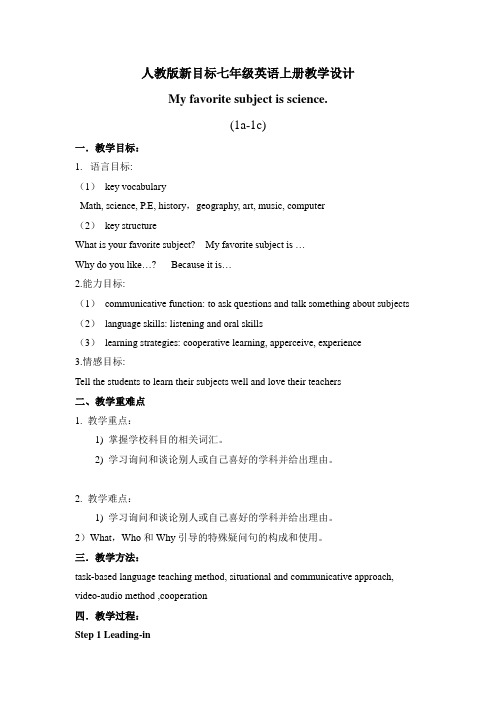
人教版新目标七年级英语上册教学设计My favorite subject is science.(1a-1c)一.教学目标:1.语言目标:(1)key vocabularyMath, science, P.E, history,geography, art, music, computer(2)key structureWhat is your favorite subject? My favorite subject is …Why do you like…?Because it is…2.能力目标:(1)communicative function: to ask questions and talk something about subjects (2)language skills: listening and oral skills(3)learning strategies: cooperative learning, apperceive, experience3.情感目标:Tell the students to learn their subjects well and love their teachers二、教学重难点1. 教学重点:1) 掌握学校科目的相关词汇。
2) 学习询问和谈论别人或自己喜好的学科并给出理由。
2. 教学难点:1) 学习询问和谈论别人或自己喜好的学科并给出理由。
2)What,Who和Why引导的特殊疑问句的构成和使用。
三.教学方法:task-based language teaching method, situational and communicative approach, video-audio method ,cooperation四.教学过程:Step 1 Leading-in教师展开一张幻灯片上的一个句子Do you want to know what I like best?先让学生猜一猜。
新目标七年级上unit9(period4)教案教学设计(人教版英语七年级)
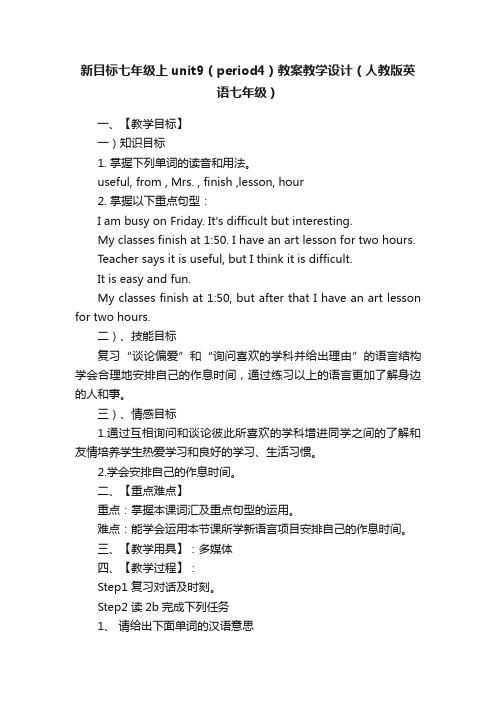
新目标七年级上unit9(period4)教案教学设计(人教版英语七年级)一、【教学目标】一)知识目标1. 掌握下列单词的读音和用法。
useful, from , Mrs. , finish ,lesson, hour2. 掌握以下重点句型:I am busy on Friday. It's difficult but interesting.My classes finish at 1:50. I have an art lesson for two hours.Teacher says it is useful, but I think it is difficult.It is easy and fun.My classes finish at 1:50, but after that I have an art lesson for two hours.二)、技能目标复习“谈论偏爱”和“询问喜欢的学科并给出理由”的语言结构学会合理地安排自己的作息时间,通过练习以上的语言更加了解身边的人和事。
三)、情感目标1.通过互相询问和谈论彼此所喜欢的学科增进同学之间的了解和友情培养学生热爱学习和良好的学习、生活习惯。
2.学会安排自己的作息时间。
二、【重点难点】重点:掌握本课词汇及重点句型的运用。
难点:能学会运用本节课所学新语言项目安排自己的作息时间。
三、【教学用具】:多媒体四、【教学过程】:Step1 复习对话及时刻。
Step2 读2b完成下列任务1、请给出下面单词的汉语意思2、将下列短语翻译成英语,并在书上划出短语。
3、根据短文信息完成2c的问题S tep 3、翻译这封信Step 4、请同学们大声朗读这封信。
Step 5、讲授1、in, on, at在日期前的用法。
⑴on 常用在表示星期几或具体某一天的名词前,在星期日下午在一个寒冷的(cold)早上⑵. in用于较长时间和固定搭配前:在早上在2012年⑶.at用于时刻前:在12:00 在7:302、free用作形容词,意为“空闲的”,其反义词为busy“繁忙的”。
黑龙江省虎林市八五零农场学校人教版七年级上册英语教案:unit 9教案

Unit 9 Do you Want to go to movie?单元整体说明单元教材分析本单元主要学习使用want来谈论和表达自己的喜好;学习运用表示品质的形容词来表达自己喜好的理由;学习连词and和but的用法;巩固行为动词一般现在时的结构和名词单、复数的构成。
本单元通过“介绍电影,谈论喜好”和“制定计划”这两个话题,设计了三个任务型活动:任务一是:根据自己的喜好,搜集奥斯卡电影资料,进行介绍;任务二是:我不确定,学习“表达计划安排”的有关知识;任务三是:学写小作文,让学生掌握“陈述理由”的方法和正确使用表示品质的形容词。
单元知识系统(树)Do you want to go to a movie? Ye s, I do. No, I don’t.Does he /she want to go to a movie? Yes, he /she does. No, he /she doesn’t.What kind of movies do you want? I like action movies and documentaries.单元总体目标通过本单元的学习让学生掌握所学目标语言;学会询问他人的喜好和谈论自己的喜好,并能够表达自己喜好某一类电影的理由;能根据自己的爱好制订出周末或节假日的行动计划。
单元重难点一览每单元学情分析本单元的主题是谈论喜好和制订计划,围绕这两个主题进行一系列的交际活动,使学生正确使用want来谈论和表达自己的喜好并学会制订计划;同时复习了行为动词一般现在时的结构和名词单、复数的构成。
对于行为动词一般现在时的构成,我们已经在第五、六单元学习过,教师一定要根据学生的实际掌握情况进行引导,尤其是“三单”形式的变化;对于名词的复数,教师要进行总结以掌握其变化规律,但重要的是让学生正确运用。
单元教学建议采用Discussing和Concluding的学习策略,利用教学图片、幻灯片、实物(电影广告、海报等)或制作课件(各种电影的精彩片段)等来展开课堂教学、Pairwork问答式的口语交际活动和小组活动,进行“询问和谈论喜好”和“制订计划”的课堂教学和练习。
人教版新目标七年级上册unit9单元设计
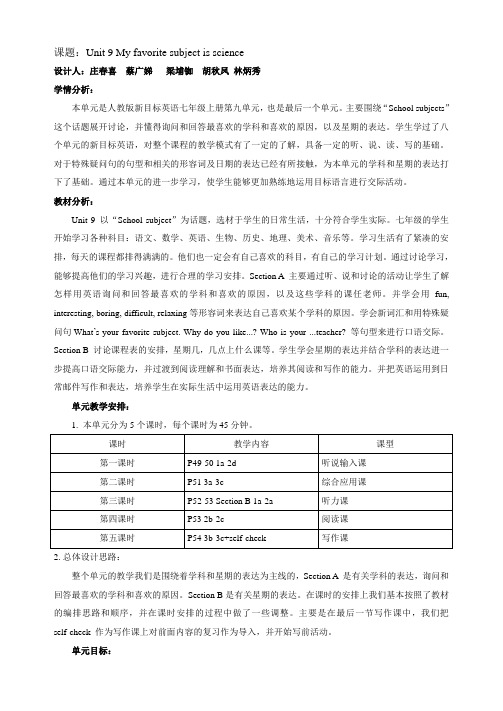
课题:Unit 9 My favorite subject is science设计人:庄春喜蔡广娣梁埔铷胡秋凤林炳秀学情分析:本单元是人教版新目标英语七年级上册第九单元,也是最后一个单元。
主要围绕“School subjects”这个话题展开讨论,并懂得询问和回答最喜欢的学科和喜欢的原因,以及星期的表达。
学生学过了八个单元的新目标英语,对整个课程的教学模式有了一定的了解,具备一定的听、说、读、写的基础。
对于特殊疑问句的句型和相关的形容词及日期的表达已经有所接触,为本单元的学科和星期的表达打下了基础。
通过本单元的进一步学习,使学生能够更加熟练地运用目标语言进行交际活动。
教材分析:Unit 9 以“School subject”为话题,选材于学生的日常生活,十分符合学生实际。
七年级的学生开始学习各种科目:语文、数学、英语、生物、历史、地理、美术、音乐等。
学习生活有了紧凑的安排,每天的课程都排得满满的。
他们也一定会有自己喜欢的科目,有自己的学习计划。
通过讨论学习,能够提高他们的学习兴趣,进行合理的学习安排。
Section A 主要通过听、说和讨论的活动让学生了解怎样用英语询问和回答最喜欢的学科和喜欢的原因,以及这些学科的课任老师。
并学会用fun, interesting, boring, difficult, relaxing等形容词来表达自己喜欢某个学科的原因。
学会新词汇和用特殊疑问句What’s your favorite subject. Why do you like...? Who is your ...teacher? 等句型来进行口语交际。
Section B 讨论课程表的安排,星期几,几点上什么课等。
学生学会星期的表达并结合学科的表达进一步提高口语交际能力,并过渡到阅读理解和书面表达,培养其阅读和写作的能力。
并把英语运用到日常邮件写作和表达,培养学生在实际生活中运用英语表达的能力。
单元教学安排:1. 本单元分为5个课时,每个课时为45分钟。
人教版新目标初一英语七年级上册Unit9单元说课稿和教案设计

⼈教版新⽬标初⼀英语七年级上册Unit9单元说课稿和教案设计Unit 9 My favorite subject is science.1.学会谈论⾃⼰或他⼈喜欢的事情并给出理由。
2.掌握who, what, why 引导的特殊疑问句及答语。
通过听⼒⼊⼿,符合学⽣的认知,再通过说和讨论等活动促使学⽣掌握谈论⾃⼰喜好的学科或⾃⼰喜好的其他事情并给出理由,并学会⽤Wh-特殊疑问句来进⾏⼝语交际。
教学突破:联系实际,创设语境,通过听说活动反复训练谈论⾃⼰喜好的学科或⾃⼰喜好的其他事情并给出理由、Wh-特殊疑问句和答语;在阅读中培养学⽣捕捉细节的能⼒;并通过写作训练引导学⽣学会合理地安排⾃⼰的作息时间。
注意⽅法与价值观的培养:以听说带动本单元的话题,在真实的语境中感知本单元的词汇和句型,培养学⽣良好的沟通能⼒。
归纳总结Wh-特殊疑问句的构成,培养学⽣⾃主学习的能⼒。
运⽤循序渐进的写作训练,写出⾃⼰⼀天的学习和活动安排,培养学⽣⾃我管理的意识。
第⼀课时:Section A 1a-1c 第⼆课时:Section A 2a-3c 第三课时:Section B 1a-2c第四课时:Section B3a-Self Check星期的由来⼀个星期有七天,每⼀天都有⼀个名称,说起来还有来历呢。
最早给星期中每⼀天命名的是古埃及⼈和古罗马⼈,他们分别以太阳、⽉亮和五⼤⾏星的名称作为⼀周七天的名称,即the day of the sun 、 the day of the moon 、 the day of the Mars(⽕星)、the day of the Mercury(⽔星) 、the day of Jupiter(⽊星) 、the day of Venus(⾦星)和 the day of the Saturn(⼟星)。
随着历史的发展,富有想象⼒的“约翰⽜”(John Bull 英国⼈)⽤他们所信奉的神灵的名称来称呼星期中的每⼀天。
- 1、下载文档前请自行甄别文档内容的完整性,平台不提供额外的编辑、内容补充、找答案等附加服务。
- 2、"仅部分预览"的文档,不可在线预览部分如存在完整性等问题,可反馈申请退款(可完整预览的文档不适用该条件!)。
- 3、如文档侵犯您的权益,请联系客服反馈,我们会尽快为您处理(人工客服工作时间:9:00-18:30)。
用心
爱心
专心
1
Unit 9 Do you Want to go to movie?
单元整体说明单元教材分析本单元主要学习使用
want 来谈论和表达自己的喜好;学习运用表示品质的形容词来表达
自己喜好的理由;学习连词
and 和but 的用法;巩固行为动词一般现在时的结构和名词单、
复数的构成。
本单元通过“介绍电影,谈论喜好”和“制定计划”这两个话题,设计了三个任务型活动:任务一是:根据自己的喜好,搜集奥斯卡电影资料,进行介绍;任务二是:我不确定,学习“表达计划安排”的有关知识;任务三是:学写小作文,让学生掌握“陈述理由”的方法和正确使用表示品质的形容词。
单元知识系统(树)
Do you want to go to a movie? Ye
s, I do. No, I don
’t.
Does he /she want to go to a movie? Yes, he /she does. No, he /she doesn ’t.
What kind of movies do you want? I like action movies and documentaries. 单元总体目标
通过本单元的学习让学生掌握所学目标语言;学会询问他人的喜好和谈论自己的喜好,并能够表达自己喜好某一类电影的理由;能根据自己的爱好制订出周末或节假日的行动计划。
单元重难点一览
重点
难点1.复习词汇:want ,like ,and ,but ,interesting ,boring
2.词汇:go ,movie ,action ,comedy ,documentary ,thriller
,Beijing
Opera ,scary ,funny ,sad ,exciting
,kind
3.句型:Do you want to go to a movie? Yes
,I do ./No ,I don ’t . Does he /she want to go to a movie?
Yes
.he /she does ./No .he /she doesn ’t .
What kind of movies do you want? I like action movies and documentaries
.
语法重点:行为动词一般现在时的结构;名词单、复数的构成
和使用。
每单元学情分析
本单元的主题是谈论喜好和制订计划,围绕这两个主题进行一系列的交际活动,
使学生
正确使用want 来谈论和表达自己的喜好并学会制订计划;同时复习了行为动词一般现在时
的结构和名词单、复数的构成。
对于行为动词一般现在时的构成,
我们已经在第五、六单元
学习过,教师一定要根据学生的实际掌握情况进行引导,尤其是“三单”形式的变化;对于名词的复数,教师要进行总结以掌握其变化规律,但重要的是让学生正确运用。
单元教学建议采用Discussing
和Concluding 的学习策略,利用教学图片、幻灯片、实物
(电影广告、
海报等)或制作课件(各种电影的精彩片段
)等来展开课堂教学、Pairwork 问答式的口语交际
活动和小组活动,进行“询问和谈论喜好”和“制订计划”的课堂教学和练习。
本单元的教学法建议:语音教学——让学生进行模仿操练;
词汇教学——采取情景介绍或演示对比的方
式进行教学,让学生在情境中操练、理解含义并学会运用;口语教学——采取
pairwork
问。
